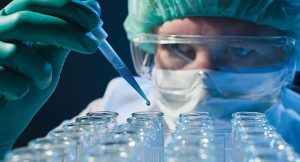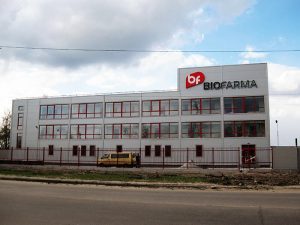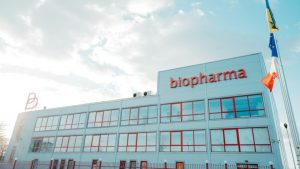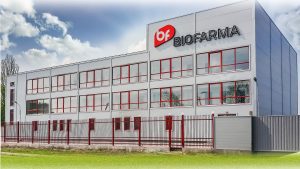
Biopharmaceutical company Biopharma (Kyiv) plans to invest from $20 million to $23 million in the development of a network of plasma centers by 2025, Biopharma President Kostiantyn Yefymenko said.
“We plan to invest about $15 million in the next three years (in 2021, 2022 and 2023) in the development of blood plasma processing facilities at our site in Bila Tserkva. And we plan to invest in plasma centers during this time about $20-23 million by 2025,” he said in an interview with Interfax-Ukraine.
Yefymenko said that the company already has seven plasma centers, including in Cherkasy, Kyiv, Kharkiv, Dnipro, Konotop, Shostka and Sumy.
In 2021, Biopharma plans to build four more plasma centers in Kamianske, Mykolaiv and Poltava.
“As for the fourth plasma center […] we are now thinking whether it will be Kryvy Rih or Kherson. We intend to build plasma centers and blood centers in every regional center of Ukraine in five years,” Yefymenko said.

Biopharmaceutical company Biopharma (Kyiv) has collected COVID-19 plasma for the production of the first batch of hyperimmune immunoglobulin, President of the company Kostiantyn Yefymenko has said.
Biopharma has collected 2,200 liters of COVID-19 plasma. For the first loading of the fractionator, 1,800 liters are needed, we have an even larger volume,” he told reporters during a visit to the company’s plasma center in Kyiv on Tuesday, November 24.
Yefymenko said that the company plans to carry out the first load of the fractionator next week to produce the first batch of hyperimmune immunoglobulin from the plasma of people who have had COVID-19.
According to Yefymenko, it takes eight or nine days to produce the drug.
The company started collecting COVID-19 plasma in May, but the collection process was slow at that time as the number of people who had COVID-19 was small.
“Now the speed of plasma collection has increased,” Yefymenko said.
He reported that the cost of one bottle of the drug can reach UAH 10,000, three or four bottles could be needed for treatment.
The production of one bottle requires about 2.5 liters of plasma. During one donation, a donor can donate up to 800 milliliters of plasma.
Biopharma is a Ukrainian biotechnology company, the only plant in Eastern Europe that has modern technologies, has been producing and developing drugs from donor plasma for almost 50 years.
The company is focused on providing medicines to Ukraine and on a contract basis, supplies its products to more than 30 countries around the world. In the fall of 2019, Biopharma moved its production to a new research and production complex in Bila Tserkva.
The company is developing a network of its own plasma centers. Now they work in Sumy, Shostka, Konotop, Cherkasy, Dnipro and Kharkiv.

The biopharmaceutical company Biopharma (Kyiv) is limited in possibilities of increasing production of the Bioven medication (immunoglobulin) due to the lack of plasma donation culture in Ukraine and the lack of plasma, Oksana Plotnikova, director of strategic development at Biopharma, has said.
“We would like to expect an increase in Bioven production, which is why we are creating plasma centers to increase donor activity among the population. We have many blood donors, but the country does not have a culture of plasma donation for fractionation,” she said at a press conference on the completion of clinical trials of the Bioven drug in the complex therapy of patients with coronavirus disease (COVID-19) on Wednesday.
Plotnikova said that as the world completes clinical trials confirming the effectiveness of drugs based on blood plasma in treatment of COVID-19, the demand for such drugs, and, therefore, plasma will grow.
“We are on the verge of the fact that many countries – Canada, Europe – will restrict imports. There will be no imported drug in the country,” she said.
Plotnikova reported that “Ukrainian donors today do not donate the amount of plasma that could meet the needs of Ukraine.”
“Today, in order to provide Ukraine, we buy plasma from the United States, Slovakia. We cannot buy Indian or Vietnamese plasma, because we do not buy plasma that is not standardized under European standards,” she said.
Plotnikova said that Biopharma actively cooperates with communal blood centers, “so that communal stations develop, reconstruct and procure not only blood components for hospitals, but also plasma for fractionators to provide Ukraine with drugs.”
“The demand for intravenous infusion of immunoglobulin G, and subsequently convalescent plasma and hyperimmune immunoglobulin, is obvious. Today we see and understand that the real effectiveness of the drug makes it possible to save lives, which means that the need is growing,” she said.

Investment of the pharmaceutical company Biopharma is $15-20 million, co-owner of the company Kostiantyn Yefymenko has said.
“We have already invested $125 million in production facilities. We continue to invest $15-20 million every year. And we have not yet begun to build a second plant, for example, in Egypt. When we build it, investments will be even bigger,” he said during a discussion panel at the Kyiv International Economic Forum.
Yefymenko said that “the decision to sell the plant to the pharmaceutical company STADA was strategic.”
“We have built two plants. One plant that produces generic drugs, hormones and probiotics, we brought to a turnover of EUR 40 million and sold it completely to STADA,” he said, adding that “STADA and not only STADA is watching and continues to look at not only Biopharma, but also other pharmaceutical companies.”
Yefymenko spoke about the negotiations between Biopharma and STADA. “I can’t say that it took much time for them to come. STADA bought the plant and we have a completely transparent fence with them, because we are on the same site. STADA and I have remained partners, since all the infrastructure that we built, we have with them 50×50. This is a transformer substation, gas hydraulic fracturing, water supply, sewage and fire protection system,” he said.
“STADA is considering the possibility of expanding its plant, we are considering expanding our plant,” Yefymenko said

Biopharma pharmaceutical company is mulling the possibility of building fractionation plants in Latin America and Africa, co-owner of the company Kostiantyn Yefymenko has said.
“Our next project will be the construction of a blood fractionation plant on other continents. We are now considering Latin America and Africa,” he said during a discussion at the Kyiv International Economic Forum.
Yefymenko noted that currently Biopharma chooses “between Egypt and Nigeria.”
“We associate this with the political situation in both countries. Our next investment will be the expansion of the business of blood plasma fractionation and the construction of plasma centers in these countries,” he said.
Biopharma is a Ukrainian biotechnology company, the only plant in Eastern Europe that has modern technologies, and has been producing and developing medicines from donated plasma for almost 50 years.
The company is focused on providing Ukraine with medicines and supplies its products to more than 30 countries of the world on a contractual basis. In the autumn of 2019, Biopharma moved its production to a new scientific and production complex in Bila Tserkva.
The company is developing a network of its own plasma centers. Now they work in Sumy, Shostka, Konotop, Cherkasy, Dnipro and Kharkiv.

Biopharma pharmaceutical company intends to fulfill its annual production plan through large orders in the fourth quarter, co-owner of the company Kostiantyn Yefymenko has said during the presentation of the study “Portrait of a Ukrainian Entrepreneur” conducted by the Union of Ukrainian Entrepreneurs together with UMG with the support of Cipe.
“COVID-19 hit our business very seriously. We allocated UAH 15 million for humanitarian aid – we helped the Public Health Center and installed a laboratory for PCR and EIA diagnostics. We have already spent about UAH 10 million for the purchase of personal protective equipment and payment for our employees, work from home,” he said.
“Our business in April-June fell in total, I think, by 50%. After all, we produce hospital drugs. In Ukraine, virtually all operations except urgent ones were closed. We also suffered losses in a number of export regions. Now, since September, it is actually the first month our business has resumed, and we see large orders for the fourth quarter. In fact, for the fourth quarter we need to do what we did in six months and therefore we plan to fulfill the annual plans at our enterprises. The Tribo group of companies, I think, will lose 20% of proceeds in dollars. We are preparing for difficult times, preparing reserves,” the expert added.
In addition, Yefymenko noted that Biopharma plans to occupy 5% of the market for production of drugs from donor plasma in five years.
“We want to process one million liters of plasma within five years, we want to occupy 5% of the world market. Our mission is to bring the availability of protein therapy to developing countries. For this, we want to build plasma centers in at least four countries of the world as we are only in Ukraine now. If we are talking about plans for the next ten years, we have a task to build two more plants on two continents. To occupy about 10-12% of the world market and from 13 companies that are engaged in fractionation of blood plasma in the world (the company ranks 12th), we want to enter the seven, that is, we must be a company with a turnover of at least $750 million,” he said.